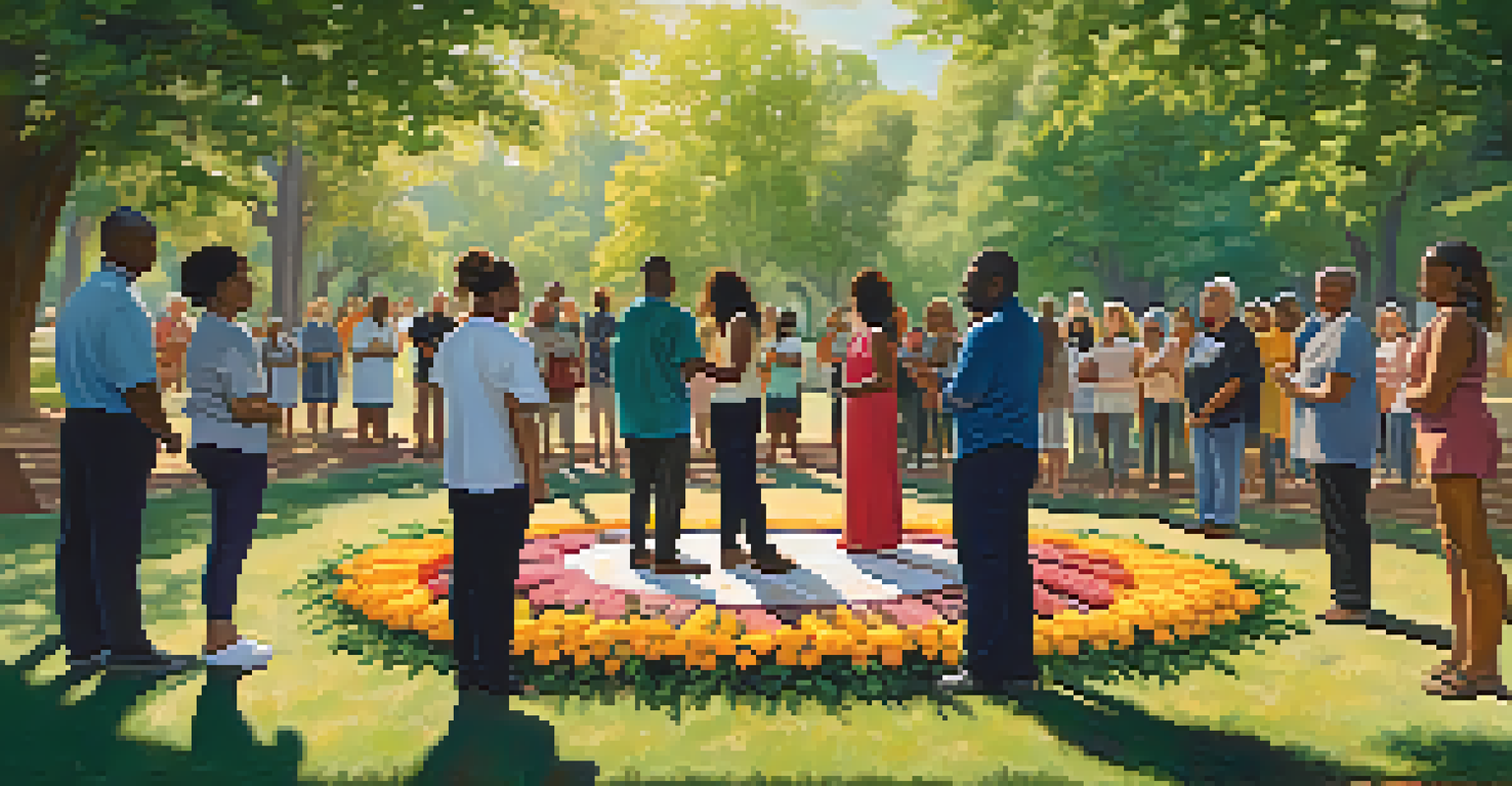Spirituality and Identity: The Journey Through Life's Challenges

Understanding Spirituality: A Personal Journey
Spirituality is often a deeply personal journey that varies from person to person. It encompasses beliefs, values, and practices that connect individuals to something greater than themselves. This connection can take many forms, whether through religion, nature, or personal introspection. Understanding your own spirituality can be a pivotal step in navigating life’s challenges.
Life isn't about finding yourself. Life is about creating yourself.
As we face hardships, our spiritual beliefs can provide comfort and guidance. For instance, someone might find solace in meditation during stressful times, while another might turn to community prayer. These practices help anchor us amidst chaos, offering clarity and strength. Thus, spirituality often becomes a compass, guiding us through life’s turbulent waters.
Ultimately, exploring spirituality invites us to reflect on who we are and what we value. It encourages self-discovery, prompting us to ask profound questions about our identity. This introspection can lead to growth and resilience, serving as a powerful tool when confronting life's inevitable obstacles.
Identity Formation: Shaped by Experiences
Our identity is not static; it evolves through our experiences, particularly during challenging times. Each obstacle we encounter can influence our self-perception and beliefs. For example, overcoming a significant setback may foster resilience and a stronger sense of self. This transformation highlights the interconnectedness of our identity and our responses to life’s difficulties.

Moreover, identity is often influenced by the cultural and social contexts we inhabit. The challenges faced within these frameworks can either reinforce or reshape our identity. For instance, someone from a close-knit community may draw strength from collective experiences, while another might find empowerment in individual struggles. This dynamic interplay illustrates how identity is continuously molded by external and internal factors.
Spirituality Shapes Identity
Our spiritual beliefs profoundly influence our sense of self and help us navigate life's challenges.
As we navigate through life, understanding the complexities of identity formation can be enlightening. It encourages us to embrace our unique paths, recognizing that every challenge contributes to our evolving self. By acknowledging these nuances, we cultivate a deeper appreciation for our journey and the identities we forge.
The Role of Resilience in Spiritual Growth
Resilience is the ability to bounce back from adversity, and it plays a crucial role in spiritual growth. When faced with challenges, resilient individuals often find ways to adapt and learn from their experiences. This adaptability can lead to a deeper understanding of oneself and one’s spirituality. For example, someone who experiences loss may emerge with a renewed sense of purpose and connection to their spiritual beliefs.
The wound is the place where the Light enters you.
Spirituality can enhance resilience by providing a framework for understanding suffering and adversity. Many spiritual traditions emphasize the importance of finding meaning in hardship, which can transform the way we perceive challenges. By viewing obstacles as opportunities for growth, we empower ourselves to face difficulties with courage and grace. This shift in perspective is a hallmark of spiritual maturity.
Ultimately, resilience and spirituality are intertwined, each reinforcing the other. As we cultivate resilience, we often discover deeper aspects of our spiritual selves. This synergy not only helps us navigate life’s challenges but also enriches our identity, making us more adaptable and reflective individuals.
Navigating Relationships Through Spirituality
Our relationships significantly impact our identity, and spirituality can enhance these connections. When we engage with others on a spiritual level, we often find deeper understanding and compassion. This shared experience can foster stronger bonds, allowing us to support one another through life’s challenges. For example, participating in group meditation can create a sense of community, enriching our collective identity.
Moreover, spirituality can help us navigate conflicts in relationships. By approaching disagreements with an open heart and mind, we can foster understanding and healing. Viewing conflicts as opportunities for growth encourages us to learn from each other, reinforcing our identities and values. This process can transform relationships, helping us grow together rather than apart.
Resilience Fuels Spiritual Growth
The ability to overcome adversity enhances spiritual understanding, fostering personal growth and deeper connections.
Ultimately, spirituality offers tools for enhancing our relationships, contributing to a more profound sense of identity. By prioritizing spiritual connection, we cultivate empathy and understanding, enriching our interactions. These strengthened relationships not only support us through challenges but also affirm our identities within a community.
Life Challenges: A Catalyst for Spiritual Exploration
Life’s challenges often serve as catalysts for spiritual exploration. When we face difficulties, we may find ourselves questioning our beliefs and seeking deeper meaning. This quest for understanding can lead us to new spiritual practices or philosophies that resonate with our evolving identities. For instance, someone grappling with a major life change might explore mindfulness as a way to find balance.
Additionally, challenges can prompt us to reassess our values and priorities. During tough times, we may realize what truly matters to us, leading to profound shifts in our spiritual journeys. This reassessment can help clarify our identity and purpose, allowing us to align our actions with our core beliefs. As a result, we often emerge from challenges with a more grounded sense of self.
In essence, adversity can propel us towards spiritual growth and exploration. By embracing these moments of questioning, we open ourselves to new insights and transformations. This process not only shapes our identities but also enriches our spiritual lives, making us more resilient and aware individuals.
Finding Purpose Through Spirituality and Identity
Many individuals find a sense of purpose through the interplay of spirituality and identity. When we engage in spiritual practices, we often uncover passions and values that define us. This discovery can lead to a greater understanding of our role in the world and how we contribute to the lives of others. For example, volunteering for a cause that aligns with spiritual beliefs can foster a strong sense of purpose.
Moreover, a clear sense of identity can enhance our spiritual practices. When we know who we are, we can engage more authentically with our spirituality. This authenticity allows us to explore practices that genuinely resonate, deepening our connection to ourselves and the universe. Consequently, this alignment can lead to a more fulfilling and purposeful life.
Change as a Spiritual Guide
Embracing life changes through a spiritual lens can empower us to adapt and thrive during transitions.
In summary, the journey of finding purpose is often intertwined with spirituality and identity. By exploring our beliefs and values, we pave the way for profound personal growth. This pursuit not only enriches our lives but also impacts those around us, creating a ripple effect of positive change.
Embracing Change: Spirituality as a Guide
Change is an inevitable part of life, and spirituality can provide guidance during transitions. Whether it’s a career shift, a relationship change, or a significant life event, our spiritual beliefs can help us navigate these waters. For instance, someone facing a job loss may turn to their spirituality for reassurance and clarity, allowing them to embrace new opportunities with an open heart.
Additionally, embracing change often requires letting go of old identities and beliefs. This process can be challenging, but spirituality encourages us to view change as a natural part of our growth. By accepting this fluidity, we can cultivate resilience and adaptability, allowing us to thrive in the face of uncertainty. This perspective can transform how we approach life’s transitions.

Ultimately, spirituality serves as a guiding light through change, helping us align with our evolving identities. By embracing transformation, we open ourselves to new experiences and insights. This journey not only enriches our spiritual lives but also strengthens our sense of self, empowering us to face whatever comes our way.
The Interconnection of Spirituality, Identity, and Growth
The relationship between spirituality, identity, and personal growth is a beautiful tapestry woven through our life experiences. Each thread represents a challenge or a triumph, contributing to our understanding of ourselves and our place in the world. As we navigate life’s ups and downs, our spirituality often acts as a guide, helping us to make sense of our journey. This interconnection fosters a holistic approach to personal development.
Moreover, recognizing this interplay can lead to profound insights. By understanding how our spiritual beliefs shape our identity, we can intentionally cultivate practices that support our growth. This awareness empowers us to take charge of our spiritual journey, ensuring it aligns with our evolving sense of self. For instance, someone may choose to engage in practices that promote self-love and acceptance, reinforcing their identity.
In conclusion, the journey through life’s challenges reveals the intricate connections between spirituality, identity, and growth. By embracing these elements, we cultivate resilience and purpose, enriching our lives and the lives of those around us. This journey is not just about overcoming obstacles; it’s about discovering who we are and becoming our most authentic selves.